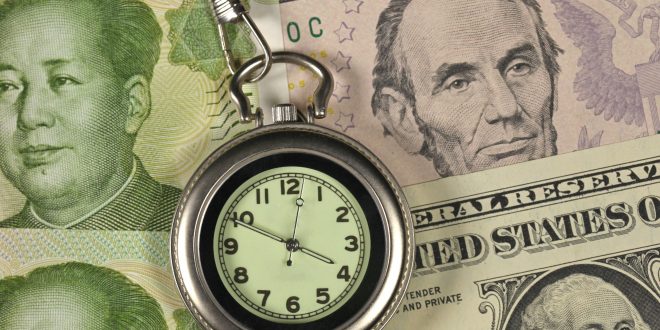It was a week full of data, from the European Central Bank to US inflation figures and Lagarde comments. Here are the week’s highlights and data.
Last week’s session observed the US dollar abandon its two-week indecisive phase and establish moderate gains.
Gold ended weekly trading in an upward trend, taking advantage of the weakness of the US dollar and expectations of further decline due to the sharp rise in consumer prices in the United States.
And gold futures contracts rose to $ 1898 an ounce compared to the daily closing recorded in the previous session at $ 1888 an ounce. Gold fell to its lowest level over the elapsed trading day at $ 1869 compared to the highest levels recorded at $ 1899.
Stocks
US stocks closed slightly higher on June 11 at the end of a losing week marked by a lack of market catalysts and persistent concerns about whether current increases in inflation may persist and cause the US Federal Reserve to tighten its accommodative policy sooner than expected.
The Nasdaq was the biggest gainer among the three major indices, while the S&P 500 made its way to its second consecutive closing record.
Weekly, the Standard & Poor’s and Nasdaq gained compared to last Friday’s close, while the Dow posted a slight weekly loss.
The Dow Jones Industrial Average rose 13.36 points, or 0.04%, to 34479.6 points, the S&P 500 index closed up 8.26 points, or 0.19%, to 4,247.44 points, the Nasdaq Composite Index increased 49.09 points, or 0.35%, to 14069.42 points.
ECB
The European Central Bank (ECB) decided to leave the interest rates on the main refinancing operations, the marginal lending facility, and the deposit facility unchanged at 0.00%, 0.25% and -0.50%, respectively, as expected.
Follow our live coverage of the ECB’s policy announcements and the market reaction.
The European Central Bank will maintain the pace of its bond purchases in the coming weeks, it said on Thursday, despite increasing its forecasts for eurozone growth and inflation.
“We believe that the steady hand is actually the right response,” ECB President Christine Lagarde told a news conference, stressing that tapering, exiting or transitioning away from the 1.85 trillion-euro Pandemic Emergency Purchase Programme had not even been discussed.
Takeaways from policy statement of ECB as by Reuters
“ECB expects interest rates to remain at their present or lower levels until it has seen inflation outlook robustly converge to a level sufficiently close to but below, 2% within the projection horizon, and such convergence has been consistently reflected in underlying inflation dynamics.”
“ECB will purchase flexibly according to market conditions and with a view to preventing a tightening of financing conditions that is inconsistent with countering the downward impact of the pandemic on the projected path of inflation.”
“ECB will continue to reinvest principal payments from maturing securities purchased under PEPP until at least the end of 2023.”
“In any case, future roll-off of PEPP portfolio will be managed to avoid interference with the appropriate monetary policy stance.”
“Net purchases will continue at a monthly pace of €20 billion.”
Oil
Oil prices rose to their highest levels in several years on Friday, June 11, to record the third week of gains in a row, supported by the improvement in global demand expectations, as the increase in vaccination activity leads to the lifting of restrictions related to the pandemic.
Brent crude futures rose 17 cents to settle at $72.69 a barrel, after hitting their highest level since May 2019.
US West Texas Intermediate crude futures advanced 62 cents to $70.91 a barrel, to be settled at their highest level since October 2018, up 1.9% during the week.
The International Energy Agency said in its monthly report that the Organization of the Petroleum Exporting Countries and its allies, within the framework of the OPEC+ group, will need to increase production to meet demand, which is set to recover to pre-pandemic levels by the end of 2022.
US Data
As measured by the Consumer Price Index (CPI), inflation in the US jumped to 5% on a yearly basis in May from 4.2% in April, the data published by the US Bureau of Labor Statistics revealed on Thursday. This reading came in higher than the market expectation of 4.7%. The CPI edged lower to 0.6% from 0.8% on a monthly basis but beat analysts’ estimate of 0.4%.
Further details of the publication revealed that the Core CPI, which excludes volatile food and energy prices, climbed to 3.8% annually from 3% in April.
The US economy is expected to grow by 4.2% and 5.3% in the second and the third quarter of 2021, respectively, the Federal Reserve Bank of New York’s latest Nowcasting Report showed on Friday.
On the other side, Canada’s merchandise trade surplus with the world widened to C$0.59 billion in April from a deficit of C$1.35 billion in March, the monthly data published by Statistics Canada revealed on Tuesday. This reading came in better than the analysts’ estimate for a deficit of C$0.8 billion.
Europe
The German ZEW headline numbers for June showed that the Economic Sentiment Index worsened unexpectedly to 79.8 from 84.4 previous while beating estimates of 86.0.
Meanwhile, the Current Conditions sub-index recovered firmly to -9.1 in June as against -40.1 recorded in the previous month and -27.8 expectations.
Separately, the Eurozone ZEW Economic Sentiment for June fell to 81.3 for the current month as compared to 84.0 previous and 77.0 consensus forecast.
The German Factory Orders unexpectedly fell in April, suggesting that the manufacturing sector in Europe’s economic powerhouse is still not out of the woods yet.
Contracts for goods ‘Made in Germany’ arrived at -0.2% on the month vs. 1.0% expected and 3.9% last, the latest data published by the Federal Statistics Office showed on Monday.
Industrial Production in Germany unexpectedly dropped in April, the official data showed on Tuesday, suggesting that the recovery in the manufacturing sector is faltering.
G7 updates
The leaders of the group of rich countries largely agreed on the need to continue to support their economies through fiscal stimulus, a source familiar with the G7 discussions said Friday, June 11.
The source said that the leaders believe that there must be long-term policies to ensure the soundness of public finances in the future, while the opinion about inflation is that the recent rise after exiting the closure procedures in many countries will be temporary.
Regarding China, Reuters quoted a senior official in the administration of US President Joe Biden on Saturday, June 12, that the leaders of the Group of Seven countries have reached a consensus on the need for a common approach to China’s selling of its exports at low prices as well as to human rights violations.
He noted that the leaders of the seven countries with the largest and most advanced economies in the world also agreed on the need for coordination regarding the flexibility of supply chains to ensure that each democratic country supports the other.
Coronavirus
On Saturday, June 12, the French health authorities said that France had given the first dose of the Coronavirus vaccine to more than 30 million people, achieving the government’s goal in mid-June.
The number of deaths from the Coronavirus in French hospitals increased to 34 cases during the past 24 hours, bringing the total deaths close to 84,000 cases since the start of the pandemic.
Britain recorded 8,125 new coronavirus cases on Friday, June 10, an increase of 732 cases from the previous day and the highest daily total since February 26, government data showed.
The government also recorded 17 new deaths from the Coronavirus.
 Noor Trends News, Technical Analysis, Educational Tools and Recommendations
Noor Trends News, Technical Analysis, Educational Tools and Recommendations





